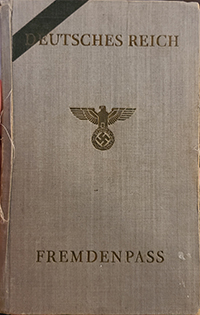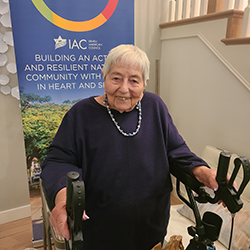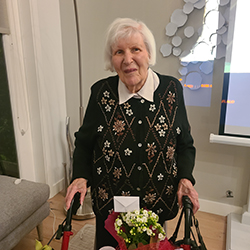Story and Photos by Miriam Gershenson

SAN DIEGO– Zikaron BaSalon is a Hebrew phrase that translates to “Memory in the Living Room.” It is an Israeli grassroots initiative that aims to commemorate the Holocaust.
During Zikaron BaSalon gatherings, people open their homes to friends, family, and neighbors to hear personal stories, memories, and testimonials of Holocaust survivors or their descendants. These gatherings provide a space for reflection, empathy, and connection, allowing participants to honor those who lived and those who perished during this dark time of civilization. It allows for participants to deepen their understanding of the impact of war and conflict on individuals and communities.
Zikaron BaSalon was founded in 2011 by a group of Israeli friends who sought to create a meaningful and inclusive way to observe Yom HaShoah. Since then, it has grown into a widespread movement, with thousands of gatherings taking place across Israel and in Jewish communities around the world each year.
Participating in Zikaron BaSalon allows people to commemorate the memory of the fallen and the survivors in a personal and meaningful way, fostering a sense of unity, solidarity, and shared responsibility. It serves as a reminder of the importance of remembering and honoring those who have lived and died during and throughout the Holocaust.
Five years ago, Zohar Cohen decided to put this event together with the Israeli- American Council (IAC) when she was part of Gvanim, a leadership program offered by IAC. When she moved on from Gvanim, she decided to continue her work with Zikaron BaSalon and continue the partnership with IAC. On May 5, Cohen and IAC put together the event for this year.
 The event in the Carmel Valley neighborhood of San Diego had two survivors speaking, Debby Stauber and Marguerite Morris. We heard two very different experiences from these two lovely ladies and even had a chance to hold in our hand part of history. The passport that belongs to Stauber was surreal to hold as the passport was adorned with the Nazi swastika on it. Seeing how Stauber kept everything in pristine condition was also surprising. I have only ever seen similar things in museums such as Yad VaShem and various others in Berlin, Germany, and they were not nearly as well preserved.
The event in the Carmel Valley neighborhood of San Diego had two survivors speaking, Debby Stauber and Marguerite Morris. We heard two very different experiences from these two lovely ladies and even had a chance to hold in our hand part of history. The passport that belongs to Stauber was surreal to hold as the passport was adorned with the Nazi swastika on it. Seeing how Stauber kept everything in pristine condition was also surprising. I have only ever seen similar things in museums such as Yad VaShem and various others in Berlin, Germany, and they were not nearly as well preserved.
My husband, who has no tolerance for Nazi relics, was battling within himself the urge to rip the passport up as he was sickened seeing and holding an item with a swastika. But of course he refrained from doing so while realizing, as painful as it is, it is important to preserve it for the continued use of it in presentation and teachings of the current and future generations.
When opening the passport to look inside, I noticed something that was very interesting to me. Stauber’s paperwork stated that she was stateless under the birthplace section. I did not have a chance to ask Stauber about this or the fact that in the passport the name was different from that she uses today. I think I was still processing what I saw that during the Q & A portion, the question hadn’t made it to the part of my brain that could form the question. But I did some research and found that in Germany’s pre-Nazi era Fremden Passes were issued to refugees from other countries, such as those escaping from Communist Russia. After the Nazis came to power, those “undesirables” without “Aryan blood” were stripped of their citizenship which in turn made them “stateless.”
This event was very well put together. Before walking in, we were already partaking in a ceremony. There were three young girls that greeted my husband and me at the entrance. They asked us in Hebrew if we would like to light a candle. Of course we did. The candles were set on a table outside in the formation of a six and the letter “M,” representing the six million Jews that have perished during the Holocaust.
Once inside, we realized the event was true to its name. Chairs were set up in the living room, and tea and fruit were available in the kitchen. It was a tight squeeze as the event was full. But everyone felt comfortable as we knew we were all there for the same reason and we were all sharing the same tradition. I didn’t feel like I was in a room full of strangers.
When the event started, it began with Cohen leading a flower ceremony. The survivors as well as other women and girls in the crowd received a white rose. The ceremony usually has six roses to represent the six million Jews who have perished during the Holocaust. This year, an extra rose was added to represent the hostages and those murdered during the October 7th attack.
Guri Stark was the emcee for the event. He is also a harmonica player, and performed for us that night along with Sharona Weiss who has the most angelic voice I have ever heard. She carried us through multiple songs throughout the evening. After hearing the stories from the Holocaust survivors, Noy Nehardea gifted the survivors flowers and addressed the crowd thanking everyone for coming and crediting those involved in the event. The event ended with everyone standing up to sing Hatikvah.

All in all, this was a very touching event. There is no way to truly express the feeling of hearing Holocaust survivor stories directly from the source. Stauber, who was born in Poland, was able to leave before the Nazis got to her. Originally, her family was supposed to head to the United States together. Unfortunately, her father was detained before boarding the ship which meant the rest of the family couldn’t board either. While her mother was trying to figure out what to do, her brother turned 16 and was taken away as well. It was after this, that her mother decided to ship Stauber and her sister off to the United States while she stayed behind to wait for their father.
Stauber was raised by another family where she shared a room with an older man who did inappropriate things to her. She ended up reuniting with both her siblings years later and was able to finally get out of the home she was raised in when she met her husband. Given all this, Stauber spoke with confidence and humor, captivating the audience with her positive and objective point of view.

Marguerite Morris, who is French, and was in hiding with her mother until the liberation. Her father enlisted in the French army. He returned from duty and a year later was sent to a concentration camp. She never saw him again. Morris had a total opposite approach to telling her story which showed the stark contrast of how the events of WWII have affected different survivors in different ways for the rest of their lives.
We are so fortunate to be able to experience survivors’ testimonies. We should hold on to these stories and share them as much as we can because the sad truth is, each year, we have fewer survivors and eventually, there won’t be any. In a world where we are already battling people who deny the Holocaust ever happened, it will only be that much more difficult when we do not have the people who lived through it.
*
Miriam Gershenson is a dog-loving freelance writer based in Escondido.